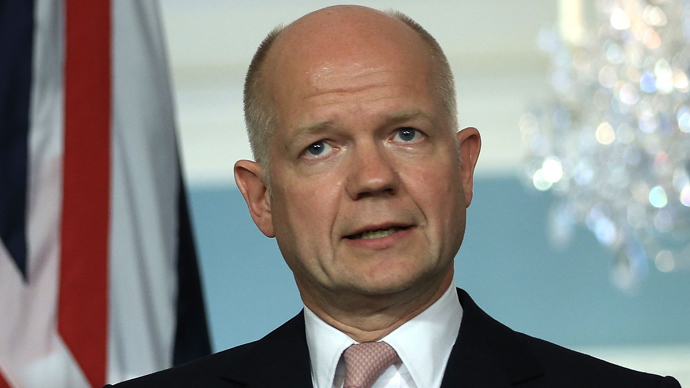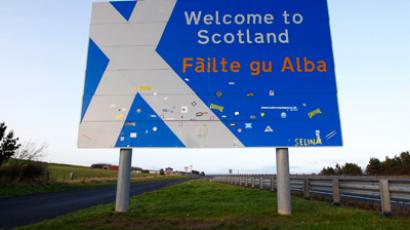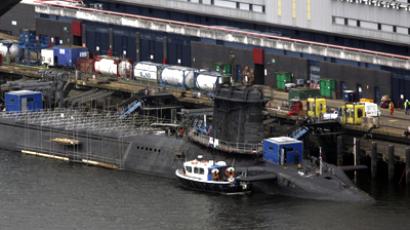Not financially capable? UK Foreign Sec pleads against Scotland independence bid

British Foreign Secretary has entered the referendum debate, saying that Scottish independence “baffles” the global community and warning of dire economic repercussions. But a former SNP adviser argues that Scotland is one of the richest areas in Britain.
Scotland could be set to leave the UK in 2014 after a referendum on independence in September of that year. Approximately one-third of voting-age Scots believe the country should seek independence from London’s dominance, according to an Angus Reid Public Opinion poll published in February. A series of recent actions have demonstrated significant public support for Scottish independence.
In an effort to prevent such a scenario, UK Foreign Secretary William Hague for the first time entered the referendum debate in a major way in Edinburgh on Thursday, saying that Scotland is “safer in the UK” and that it benefits from London’s political links abroad, such as the network of embassies.
He also warned that Scotland should expect big changes if it becomes independent – such as facing the “inconvenience and tremendous burden of having to start again in world affairs” – while complimenting Britain’s own global diplomatic network.
Hague also touched upon the hotly debated issue of the potential expense an exit would have for Scotland’s financial institutions: “The cost of creating new institutions would place an enormous burden on the Scottish taxpayer; it would also take years to develop the infrastructure and qualified personnel that are needed to deal effectively with the array of threats that we all face.”
“I am not here to make dire predictions or to issue dark warnings,” Hague said, going on to suggest that an independent Scotland would face an “uncertain future.”
Earlier, Scots have already blasted a ‘scaremongering’
May Treasury report claiming the country
could see economic crises similar to those of Cyprus, Ireland and
Iceland if it leaves the UK.
Scottish aversion to Westminster dominance
Scotland’s union with England is some 305 years old, but the two countries were joined together by default under the same king in 1603. However, Scotland has maintained for years that it is subordinate to England’s southern-centric style of governance, and that Westminster continues to dominate both policy and resources.
“The Empire has gone, the colonies have gone, about 50 nations have become independent of London. London’s an old hand at this,” Scottish MP Angus MacNeil told RT.
Alex Salmond, a former financial adviser to the pro-independence Scottish National Party (SNP), did not seem to take the same line as Hague on the country’s financial institutions. He lectured in Edinburgh on Wednesday night that “Scotland is the richest part of the United Kingdom outside London and the south-east of England.”
Scotland is financially capable, MacNeil declared – perhaps even more so than London: “The UK government should be well aware that they haven’t funded themselves since 2001. It’s 12 years they haven’t balanced the books. Scotland is actually 8.4 percent of the UK population paying 9.9 percent of the taxation of the UK.”
Scottish independence is a divisive topic that has fueled debate for centuries, but MacNeil feels that the issue is being overcomplicated by a government that is clinging to its last threads of control over the country.
“This independence that Scotland is going through like the other 142 that went through it in the past, Scotland’s is probably the best planned ever,” MacNeil said. “Can’t think of another nation that’s gone through so much planning and so much cross-examination in the lead up to its independence.”
“A vote for independence is not going to be a vote for business as usual, it’s going to bring about substantive change,” RT’s Sara Firth concluded while reporting from Edinburgh.
The UK central government’s warnings earlier this month on the
consequences of Scottish independence were considerably more
direct than Hague’s. Home Secretary Theresa May stated that if
Scotland votes to separate from the UK, its residents would be
forced to relinquish their British passports.
“If the vote in the referendum is for a separatist vote then Scotland will become a separate state – it will not be part of the UK,” she said ominously earlier this month.
Scotland was also snubbed by the British Government in April when
Chancellor George Osborne warned that if Scotland left the UK,
they would no longer be able to use the British Pound as a
currency.
Scottish politicians and activists see an upside to the departure
from economic control. “We would disarm trident nuclear
weapons and would spend that money on our schools, on our
hospitals and on our public services,” said Jonathan Shafi,
Radical Independence chairman, criticizing cuts to nationwide
public services which hit Scotland hard too.
“If Scotland had its own powers over the economy, its own
powers over critical issues like defense, then we could play a
much more productive role on the world stage,” he said.
Shafi pointed out that Scotland only has one elected Conservative
MP and Hague’s affiliation with the unpopular party only serves
to further the cause of independence and didn’t endear him to the
country on his visit.














